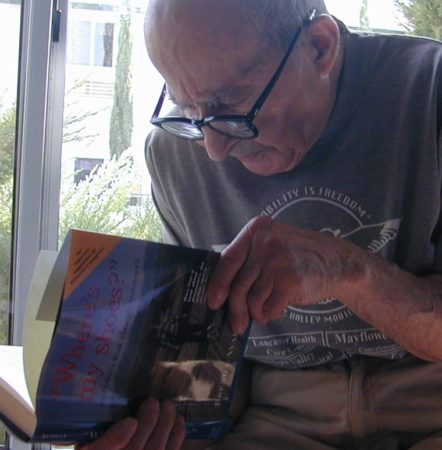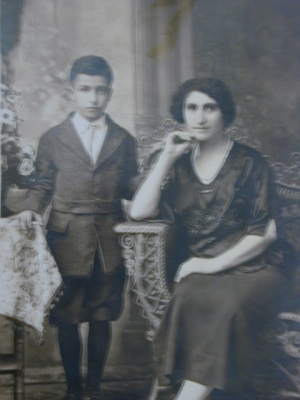As a family caregiver, how do you respond when a person with dementia exists in a reality that is different than yours?

My father who lived with Alzheimer’s, would often travel across three time zones—the past, present, and future.
He kept me guessing about who or what he was talking about. For instance, if he mentioned that Ma was out shopping, I was rarely certain if he were talking about his mother or his wife, my mother. I’d ask questions to get a bit more context. Often, he pleasantly answered my questions, enjoying my genuine curiosity. Sometimes, he’d grow irritated that I didn’t understand. Meanwhile, I got plenty of exercise jumping to conclusions, while trying to keep up with his time travels.
One such example is adapted from “Where’s my shoes?” My Father’s Walk through Alzheimer’s 2nd ed. ©2005 (unavailable and out-of-print). We called my father by his first name. Martin in Armenian is Mardig.
Mardig mentioned that my brother brought a companion home. He didn’t know the companion’s name, only that he looked like my brother. This unnamed person helped my brother carry things out of the house. He also spent the night when my brother was away on business.
He shared these experiences so vividly, his recollections seemed real to me, too.
During one of my visits, Mardig spoke of a little girl and her friends who were in the sunroom where we were sitting.
Seeing no one, I asked, “Where are they now?”
“I don’t know,” he said with a sheepish chuckle. “I guess they went to another part of the house when they heard the doorbell ring.”
The little girl did exist. She lived with her mother across the alley behind my father’s house.
Mardig shared the details with such clarity, I searched the entire house before I was convinced no one else was home.
When I asked the social worker how to deal with these instances, she mentioned that they are hallucinations and recommended that I be patient and supportive as I orient my father to what is real.
There were instances, when my father talked about his parents shopping or at work. I reconsidered orientating him to what was real; and instead, want to learn more.

He’d see his mom so clearly; I was curious to see what he saw. Besides, I only met her a few times. Even though his father was murdered during the Armenian Genocide when Mardig was only eight years old, he’d speak of him, too.
I asked questions as I tried to enter his world to learn more.
I shared these moments with a friend who was open to the fringe possibilities of our human existence. Her profession required a lot of hope and faith as she worked to rehabilitate juvenile delinquents. She listened to me carefully while we sat at the bar in a pub enjoying our beers that early evening. When I finished, she said nothing. A void filled with uncomfortable silence. Just as I was to say something, she asked, “What if your dad has the ability to see his parents and others on the other side?”
I set down my beer without taking a sip. Her remark caused me to consider the potential of such a gift.
She followed up with, “What if Alzheimer’s has given him peace with the ability to prepare for his end-of-life journey?”
At that moment, she had given me a lot to consider.
I tend to look at the positive side of things. I began to wonder, what if there’s more to this than what professionals call hallucinations? What if people with Alzheimer’s lose some areas of their brain function while gaining greater use of others. What if they can travel through time and truly see loved ones long gone?
I wondered, WHAT IF Alzheimer’s is Really a DisEase with Reality?
We cannot know for sure. And oftentimes when we do not know something, we either brush it aside, scoff, or even laugh at the idea. But for a moment… what if?








